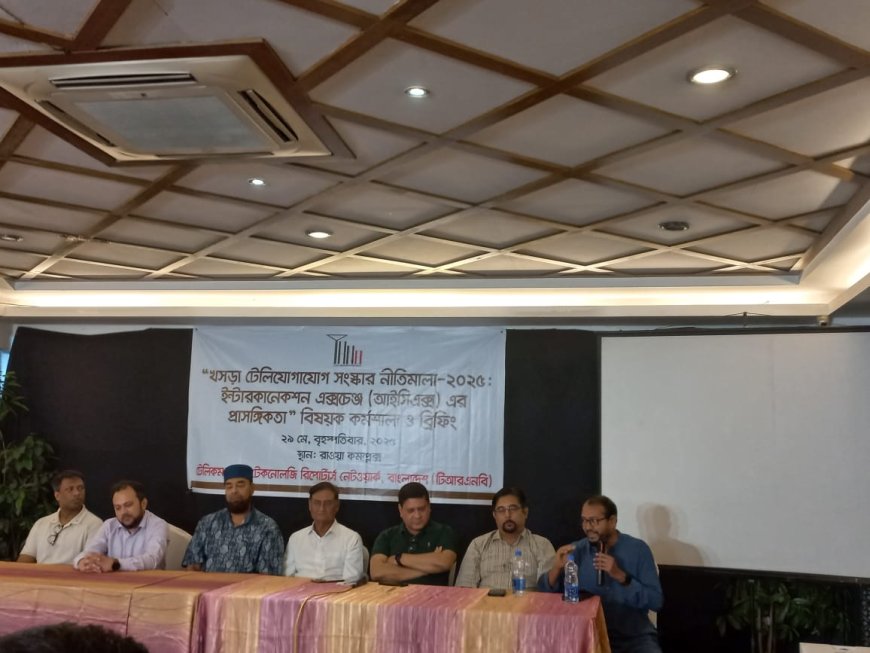Telecom Topology Turmoil: Industry Warns of Revenue Ruin, Job Loss, and Security Risks

Local telecom industry stakeholders have voiced serious concerns over the proposed elimination of the Interconnection Exchange (ICX) system under the draft “Telecommunication Reform Policy 2025.” At an open dialogue titled “Relevance of Interconnection Exchange (ICX) in the Draft Telecom Reform Policy 2025,” held on Thursday, industry leaders warned that such a move could devastate national revenue, increase unemployment, and threaten digital security.
Organized by the Telecom and Technology Reporters Network Bangladesh (TRNB), the workshop was moderated by TRNB President Samir Kumar Dey, with a welcome address by General Secretary Masuduzzaman Robin.
Brigadier General (Retd.) Mostafizur Rahman, President of the Telecommunication Infrastructure Operators of Bangladesh (TIOB), remarked, “ICX is the third eye of the telecom sector — its watchdog. Our world-class engineers have shaped this sector. But now, it is being handed over to foreign control.”
Echoing similar sentiments, TIOB Treasurer Brigadier General (Retd.) Khurshid Alam stated that the International Long-Distance Telecommunication Services (ILDTS) policy was initially formulated to protect national interests, curb money laundering, and encourage local entrepreneurship. “Just four months ago, as per government directives, we invested BDT 130 crore to upgrade from TDM to IP technology — the most advanced telecom infrastructure. Now, the proposed topology threatens to render that investment meaningless,” he said.
He warned that the new policy would allow mobile operators to function as gateways without proper licensing, bypassing ICX and reducing regulatory oversight.
Ahmedur Rahman Rumel, Head of Operations at Agni Systems, emphasized the economic impact, stating that after July, ICX facilitated the exchange of over 100 crore SMSs daily. “We are losing BDT 1.15 crore in revenue per day. If these messages are routed through ICX, the government would earn BDT 74 crore annually,” he said.
Other notable participants included Mustafa Mahmud Hossain (COO, Voicetel), Hasibur Rahman (Director, Bangla ICX), Brigadier General (Retd.) Md. Abdul Hanna (CEO, BanglaTelecom), and M. Nurul Alam (CEO, Imam Network Ltd.).
Speakers highlighted that over 50 voice service providers — including mobile, PSTN, and IP telephony operators — currently rely on ICX for interconnectivity. Without it, each operator would need to establish bilateral connections, which would be significantly costlier.
The industry warned that scrapping ICX would open the floodgates for illegal VoIP operations and massive revenue leakage. They argued that ICX plays a critical role in routing international calls via International Gateways (IGWs) to local Access Network Services (ANS), keeping all traffic under government surveillance. This system ensures national security by preventing grey traffic and unauthorized international calls.
However, the Bangladesh Telecommunication Regulatory Commission (BTRC), under the current interim government, has proposed omitting ICX from the telecom network and licensing structure in its amendment draft of the Telecommunication Act. Stakeholders say this change could severely compromise the country’s digital sovereignty.
ICX currently receives 4 paisa from the BDT 2.40 charged per mobile call — of which 2 paisa must be handed over to BTRC. Out of this, 1 paisa goes to license fees, tax, and VAT, leaving ICX operators with just 1 paisa. “Cutting that one paisa is like trimming a peacock's plume — it’s small but symbolic. Such a move could cripple the entire ecosystem,” stakeholders warned.
Local entrepreneurs strongly oppose the revision of the ILDTS policy, saying it undermines national interest, endangers jobs for over 700 engineers, and could ultimately weaken the country's telecom backbone.









































































































































































































